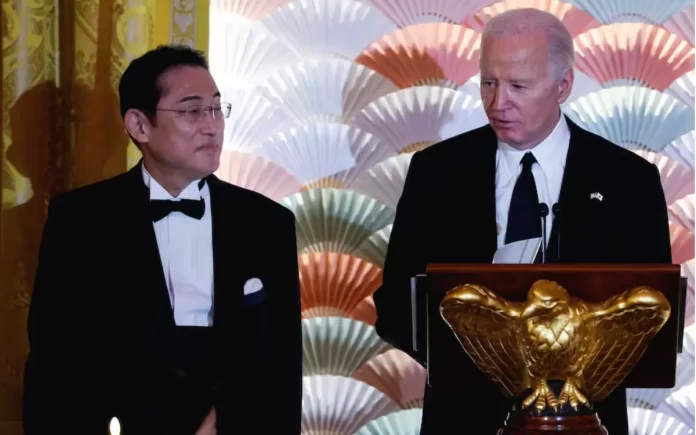Washington: In a pivotal gathering at the White House, the leaders of the United States, Japan, and the Philippines are set to confront long-standing tensions with China, particularly regarding its assertiveness in the South China Sea. President Joe Biden will spearhead discussions with Philippines President Ferdinand Marcos Jr. and Japanese Prime Minister Fumio Kishida, aiming to counter Beijing’s heightened pressure on Manila in the disputed maritime region.
Biden is slated to unveil plans for joint military initiatives and infrastructure investments in the Philippines, marking a significant step in addressing concerns over China’s influence in the region. The trilateral summit, a first of its kind, underscores the growing cooperation among the three nations in the face of China’s aggressive posturing.
At the forefront of the agenda is China’s escalating presence in the South China Sea, despite previous diplomatic efforts to ease tensions. Recent confrontations between the Philippines and China, including maritime incidents and verbal sparring, have centered on the Second Thomas Shoal, a focal point for territorial disputes.
Also Read | Meta Takes Strides for Teen Safety: Instagram to Blur Nudity in Messages
Asserting the commitment of the United States under the 1950s-era mutual defense treaty with the Philippines, Biden will reaffirm America’s obligation to respond to any armed aggression targeting Filipino forces at the Second Thomas Shoal. This clarification addresses longstanding ambiguities surrounding the treaty and demonstrates unwavering support for Manila’s sovereignty claims.
Highlighting the strategic alignment among the three nations, a senior official emphasized Biden and Kishida’s solidarity with Marcos, signaling a united front against Chinese coercion.
While China asserts expansive territorial claims in the South China Sea, including areas within neighboring countries’ exclusive economic zones, a 2016 ruling by the Permanent Court of Arbitration invalidated China’s assertions, underscoring the legal basis of competing claims.
Also Read | US Takes Action to Close ‘Gun Show Loophole’ and Strengthen Background Checks
Amidst these geopolitical dynamics, the United States plans to enhance maritime security in the Indo-Pacific region through Coast Guard joint patrols and joint training exercises. Additionally, Washington intends to bolster Philippine defense capabilities by providing humanitarian relief resources and military aid.
The summit also presents an opportunity to address broader regional challenges and promote economic development. Initiatives such as the Partnership for Global Infrastructure and Investment will support the Luzon corridor project in the Philippines, focusing on critical infrastructure sectors like transportation, energy, and telecommunications.
As tensions persist in the region, the trilateral summit underscores the importance of collective action in safeguarding regional stability and upholding international law amidst China’s assertive posture.



